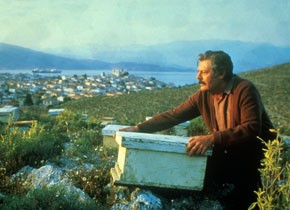Travels in Greece. In Memory of Theo Angelopoulos, 1935-2012
April 27 to May 7, 2012
When the news arrived on January 24th of this year, the shock was greater than expected: Theo Angelopoulos was dead. At that moment one could also feel that the estrangement between his recent work and contemporary cinephilia had clouded the view of his monumental achievements from the 1970s and 1980s.
Angelopoulos could no longer cope with the world-political upheavals since 1989/90, even as he tried, in vain, to find adequate means of representing them artistically. His last major work was Landscape in the Mist (1988) – today, the final gunshots of that film can be seen as announcements of future wars and collapses. Afterwards, Angelopoulos lost his way, piece by piece; indirectly, he also lost his homeland: the modern European co-production system in which he participated also compromised that inner tension which marked the director's earlier travels through Greece. In the 1970s and 1980s, Angelopolous was a giant of world cinema – and as one can see today, time has not diminshed his works from that era. They continue to shine as ever, differently perhaps from then, but that is true of all films that really mean something.
Theodoros Angelopoulos, born in Athens in 1935, was part of the wave of New Greek Cinema which began to coalesce during the late 1960s and which was later crushed and marginalized by the military dictatorship. Some left the country, others retreated into an inner exile; Angelopoulos was among those who attempted to make their films in defiance of the Junta. In 1970, he made his feature film debut with Reconstruction, the investigation of a murder – a stroke of genius, the work was instantly perceived as a manifesto. His next film, Days of 36 (1972), became his master's thesis: Angelopoulos proved to be a subversive modernist working on an aesthetic that was different from everything one had known up to that point.
Highly complex choreographed sequences are at the core of Angelopoulos' movies. Within these, time often shifts, imperceptibly – the wrinkles of history and fate are thus interlinked; lives mirror one another and the present emerges as the product of a past from which it has learned nothing. In this respect, Days of 36 is perhaps Angelopoulos' most daring work: at the height of the military dictatorship, he told a story from the early days of the future prime minister Ioannis Metaxas – drawing a parallel to the fascist Greece of the late 1930s which could hardly be avoided. For Angelopoulos, history was a tragic cycle of failure which he attempted to present in such a way as to allow the audience to understand and hopefully avoid it in the future. In his films, dialectics and sensuality, theatricality and cinematic purity, all found a way to come together in lucid and poignant fashion.
In sync with the enormity of his subjects, Angelopolous early on began to think in cycles: thus Days of 36 became the opening work of his first trilogy – that of "History." This trilogy also includes The Traveling Players (1975) and The Hunters (1977): three epic projects, a measure of Greek history from the (then) previous half-century. His next trilogy – that of "Silence" – is comprised of Voyage to Cythera (1984), The Beekeeper (1986) and Landscape in the Mist. Here, Angelopolous was in search of the Greece of his own time and discovered a fleeting world, full of people who lived more in the memories and shadows of their past than in the here and now. Greece was a country that had everything except the present. Which is perhaps why it was so easy to travel within its boundaries, weightless, despite the weight of history.
Between the two trilogies, Angelopolous directed what is perhaps his greatest work: The Great Alexander (1980), a fable of hope and its cost, set during the political chaos of the late 19th century. The film tells the story of a man who wants to bring freedom to his people. It is the only Angelopolous film where at the end – despite human frailties and the impact of history – a political utopia flickers, delicate and fragile, inhabitable and desirable. The characters in the Trilogy of Silence search for this flickering light; and the Greeks in the Trilogy of History assume the same glow to be lost. But it burns, as long as these works are remembered.
The retrospective presents all features directed by Theo Angelopolous between 1970 and 1988. With thanks to Walter Ruggle and Trigon-Film, Emmetbaden


